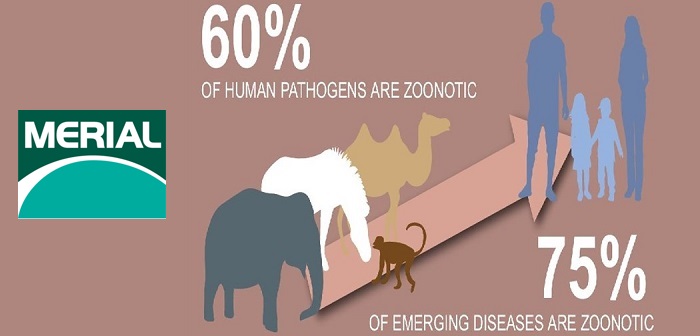The animal health company, Merial, marked World Zoonoses Day this week by addressing a list of key questions concerning the need to help raise awareness of the growing risk of zoonotic diseases.
“The speed with which diseases can spread from one region to another has greatly increased,” said the head of Merial’s livestock and veterinary public health business unit, Dr Silke Birlenbach.
“There are a number of trends that underlie the emergence of zoonotic,” she said, adding that deforestation and the destruction of eco-systems are bringing people into closer contact with wildlife.
“For example, the use of bush meat as a food source has been linked to the emergence of several zoonotic diseases such as SARS and HIV. In addition, increased temperatures are expanding the ranges of disease vectors, such as mosquitoes or ticks, so areas where diseases did not exist before are being exposed to them for the first time.
“Regarding globalization, the increase in international travel, and increased trade between nations, means that the speed with which diseases can spread from one region to another has greatly increased.”
Asked to also comment on the impacts of zoonotic diseases, Dr Birlenbach, highlighted both the human and economic effects of different diseases, including influenza viruses, circulating in farm animals, which can give rise to human pandemics with “dramatic consequences”.
“Outbreaks of zoonotic disease can be devastating for the economies of both developed and developing nations,” she said. “The 2014/2015 outbreak of avian influenza in the US led to 48 million birds being euthanized and was estimated to have caused economy-wide losses of around US$3.3 billion (£2.5 bn).
“In addition, over the past decade, avian influenza has led to the culling of 200 million birds in Asia, resulting in economic losses of over US$10 bn (£7.7 bn).”
Finally, in seeking to highlight what is being done to combat emerging, trans-boundary and zoonotic diseases, Dr Birlenbach said that Merial had recently “intensified” its commitment to help fight the problem by creating a new dedicated global structure, the Veterinary Public Health (VPH) Centre, to support governments, NGOs and private customers with the right tools. This included vaccines, strategic reserve banks and partnerships, all combined with expert advice and solutions.


